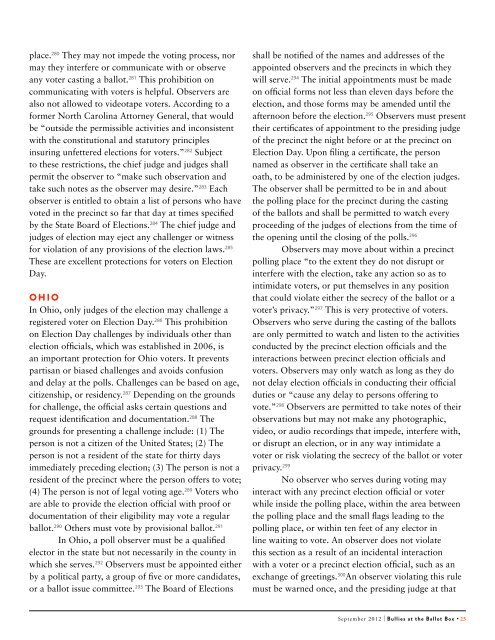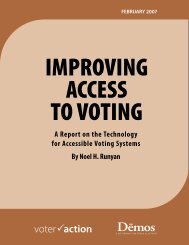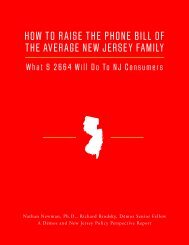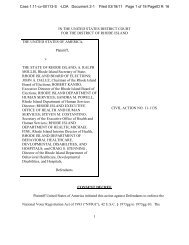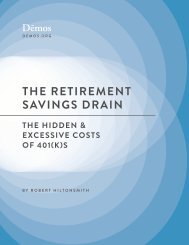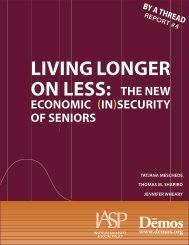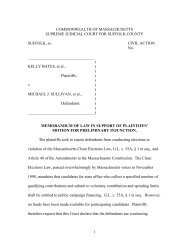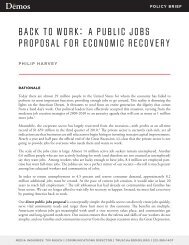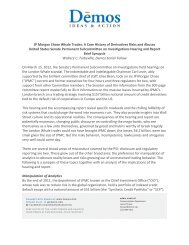Bullies at the Ballot Box - Demos
Bullies at the Ballot Box - Demos
Bullies at the Ballot Box - Demos
You also want an ePaper? Increase the reach of your titles
YUMPU automatically turns print PDFs into web optimized ePapers that Google loves.
place. 280 They may not impede <strong>the</strong> voting process, nor<br />
may <strong>the</strong>y interfere or communic<strong>at</strong>e with or observe<br />
any voter casting a ballot. 281 This prohibition on<br />
communic<strong>at</strong>ing with voters is helpful. Observers are<br />
also not allowed to videotape voters. According to a<br />
former North Carolina Attorney General, th<strong>at</strong> would<br />
be “outside <strong>the</strong> permissible activities and inconsistent<br />
with <strong>the</strong> constitutional and st<strong>at</strong>utory principles<br />
insuring unfettered elections for voters.” 282 Subject<br />
to <strong>the</strong>se restrictions, <strong>the</strong> chief judge and judges shall<br />
permit <strong>the</strong> observer to “make such observ<strong>at</strong>ion and<br />
take such notes as <strong>the</strong> observer may desire.” 283 Each<br />
observer is entitled to obtain a list of persons who have<br />
voted in <strong>the</strong> precinct so far th<strong>at</strong> day <strong>at</strong> times specified<br />
by <strong>the</strong> St<strong>at</strong>e Board of Elections. 284 The chief judge and<br />
judges of election may eject any challenger or witness<br />
for viol<strong>at</strong>ion of any provisions of <strong>the</strong> election laws. 285<br />
These are excellent protections for voters on Election<br />
Day.<br />
ohio<br />
In Ohio, only judges of <strong>the</strong> election may challenge a<br />
registered voter on Election Day. 286 This prohibition<br />
on Election Day challenges by individuals o<strong>the</strong>r than<br />
election officials, which was established in 2006, is<br />
an important protection for Ohio voters. It prevents<br />
partisan or biased challenges and avoids confusion<br />
and delay <strong>at</strong> <strong>the</strong> polls. Challenges can be based on age,<br />
citizenship, or residency. 287 Depending on <strong>the</strong> grounds<br />
for challenge, <strong>the</strong> official asks certain questions and<br />
request identific<strong>at</strong>ion and document<strong>at</strong>ion. 288 The<br />
grounds for presenting a challenge include: (1) The<br />
person is not a citizen of <strong>the</strong> United St<strong>at</strong>es; (2) The<br />
person is not a resident of <strong>the</strong> st<strong>at</strong>e for thirty days<br />
immedi<strong>at</strong>ely preceding election; (3) The person is not a<br />
resident of <strong>the</strong> precinct where <strong>the</strong> person offers to vote;<br />
(4) The person is not of legal voting age. 289 Voters who<br />
are able to provide <strong>the</strong> election official with proof or<br />
document<strong>at</strong>ion of <strong>the</strong>ir eligibility may vote a regular<br />
ballot. 290 O<strong>the</strong>rs must vote by provisional ballot. 291<br />
In Ohio, a poll observer must be a qualified<br />
elector in <strong>the</strong> st<strong>at</strong>e but not necessarily in <strong>the</strong> county in<br />
which she serves. 292 Observers must be appointed ei<strong>the</strong>r<br />
by a political party, a group of five or more candid<strong>at</strong>es,<br />
or a ballot issue committee. 293 The Board of Elections<br />
shall be notified of <strong>the</strong> names and addresses of <strong>the</strong><br />
appointed observers and <strong>the</strong> precincts in which <strong>the</strong>y<br />
will serve. 294 The initial appointments must be made<br />
on official forms not less than eleven days before <strong>the</strong><br />
election, and those forms may be amended until <strong>the</strong><br />
afternoon before <strong>the</strong> election. 295 Observers must present<br />
<strong>the</strong>ir certific<strong>at</strong>es of appointment to <strong>the</strong> presiding judge<br />
of <strong>the</strong> precinct <strong>the</strong> night before or <strong>at</strong> <strong>the</strong> precinct on<br />
Election Day. Upon filing a certific<strong>at</strong>e, <strong>the</strong> person<br />
named as observer in <strong>the</strong> certific<strong>at</strong>e shall take an<br />
o<strong>at</strong>h, to be administered by one of <strong>the</strong> election judges.<br />
The observer shall be permitted to be in and about<br />
<strong>the</strong> polling place for <strong>the</strong> precinct during <strong>the</strong> casting<br />
of <strong>the</strong> ballots and shall be permitted to w<strong>at</strong>ch every<br />
proceeding of <strong>the</strong> judges of elections from <strong>the</strong> time of<br />
<strong>the</strong> opening until <strong>the</strong> closing of <strong>the</strong> polls. 296<br />
Observers may move about within a precinct<br />
polling place “to <strong>the</strong> extent <strong>the</strong>y do not disrupt or<br />
interfere with <strong>the</strong> election, take any action so as to<br />
intimid<strong>at</strong>e voters, or put <strong>the</strong>mselves in any position<br />
th<strong>at</strong> could viol<strong>at</strong>e ei<strong>the</strong>r <strong>the</strong> secrecy of <strong>the</strong> ballot or a<br />
voter’s privacy.” 297 This is very protective of voters.<br />
Observers who serve during <strong>the</strong> casting of <strong>the</strong> ballots<br />
are only permitted to w<strong>at</strong>ch and listen to <strong>the</strong> activities<br />
conducted by <strong>the</strong> precinct election officials and <strong>the</strong><br />
interactions between precinct election officials and<br />
voters. Observers may only w<strong>at</strong>ch as long as <strong>the</strong>y do<br />
not delay election officials in conducting <strong>the</strong>ir official<br />
duties or “cause any delay to persons offering to<br />
vote.” 298 Observers are permitted to take notes of <strong>the</strong>ir<br />
observ<strong>at</strong>ions but may not make any photographic,<br />
video, or audio recordings th<strong>at</strong> impede, interfere with,<br />
or disrupt an election, or in any way intimid<strong>at</strong>e a<br />
voter or risk viol<strong>at</strong>ing <strong>the</strong> secrecy of <strong>the</strong> ballot or voter<br />
privacy. 299<br />
No observer who serves during voting may<br />
interact with any precinct election official or voter<br />
while inside <strong>the</strong> polling place, within <strong>the</strong> area between<br />
<strong>the</strong> polling place and <strong>the</strong> small flags leading to <strong>the</strong><br />
polling place, or within ten feet of any elector in<br />
line waiting to vote. An observer does not viol<strong>at</strong>e<br />
this section as a result of an incidental interaction<br />
with a voter or a precinct election official, such as an<br />
exchange of greetings. 300 An observer viol<strong>at</strong>ing this rule<br />
must be warned once, and <strong>the</strong> presiding judge <strong>at</strong> th<strong>at</strong><br />
September 2012 | <strong>Bullies</strong> <strong>at</strong> <strong>the</strong> <strong>Ballot</strong> <strong>Box</strong> • 23


